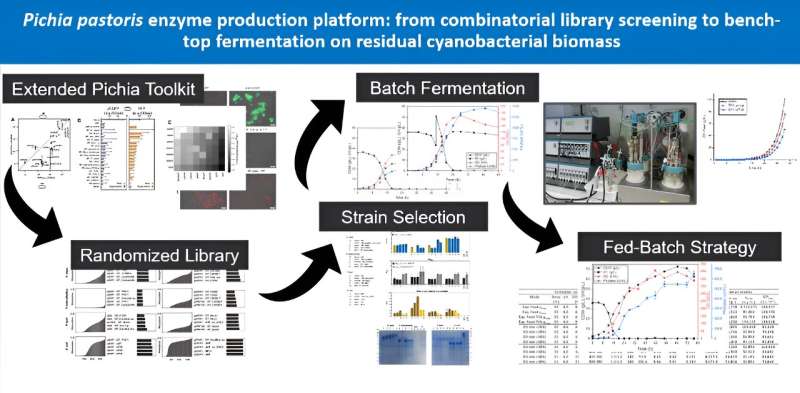This article has been reviewed according to Science X's editorial process and policies. Editors have highlighted the following attributes while ensuring the content's credibility:
fact-checked
proofread
Novel solution for Pichia pastoris enzyme production platform

The demand for industrial enzymes is continually rising, driven by the growing need to shift towards more sustainable industrial processes. Our research outlines a novel approach to enzyme production, harnessing the untapped potential of cyanobacterial biomass within the P. pastoris platform.
Group Leader Dr. Schieder highlights the nature of the study, stating, "Our work reveals the potential of cyanobacterial biorefineries to support enzyme production."
This achievement stems from an extensive multi-field approach. We characterized and expanded a combinatorial library, streamlining P. pastoris engineering for enhanced efficiency. Rigorous screening of these libraries yielded potent enzyme-producing strains, enabling the development of a fed-batch strategy for efficient AppA E. coli phytase expression.
A key element is the successful utilization of Nostoc sp. De1 biomass hydrolysate is a substrate for fermentation, presenting a viable and sustainable alternative to conventional feedstock. Korbinian Sinzinger underscores the importance of this research, stating, "Our findings demonstrate that the extended P. pastoris toolkit not only generates high-performing producer strains but also offers a greener pathway for enzyme expression, addressing the critical need for sustainable biobased production."
The paper is published in the Journal of Bioresources and Bioproducts.
More information: Korbinian Sinzinger et al, The Pichia pastoris Enzyme Production Platform: from Combinatorial Library Screening to Bench-Top Fermentation on Residual Cyanobacterial Biomass, Journal of Bioresources and Bioproducts (2023). DOI: 10.1016/j.jobab.2023.12.005
Provided by Journal of Bioresources and Bioproducts



















